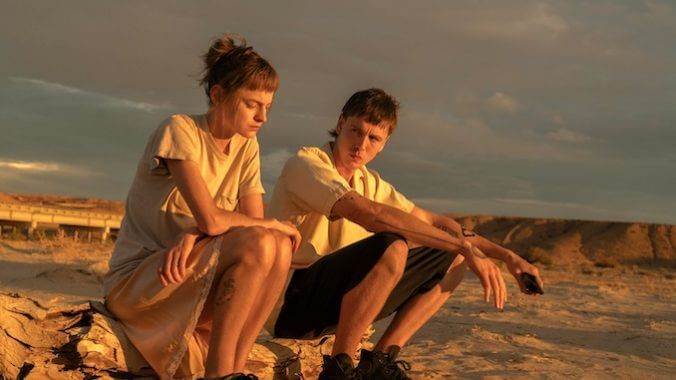A Murder at the End of the World Enters Uncharted Territory With Its Online Love Story
Photo Courtesy of FX

Prolific co-creators Brit Marling and Zal Batmanglij’s voices speak beyond generations, dimensions, and traditional storytelling with an ever-present element of complexity towards love and spirit, utilizing their work as an extremely intentional medium to touch people.
With a vast, non-conforming film and TV library under their belt, Marling and Batmanglij’s work tends to sharpen curious minds, bringing together one of the most genuine and devoted fan bases for their cult hit The OA. The devotion towards The OA is reminiscent of fan followings which existed online when cable TV was at its peak, and people would live-tweet their reactions to shows like American Horror Story, The 100, or Game of Thrones. They’ve created a powerful hive-mind of non-judgmental, loving followers who still haven’t given up on the beloved story of dimensional travel, invisible borders, and human understanding, all contained in online forums and across social platforms.
The OA harnessed a vehement Reddit page, still active daily with over 60,000 users who still ‘leave their door open’ in hopes of the show being brought back to life from its disheartening cancellation in 2019, cut short from its five-season plan that the impassioned duo originally imagined. Consistent with their considerate preceding work, they bring people together towards psychologically stimulating consciousness, and cascade willful lengths to enter meaningful themes that are oft left unexplored.
It only seems fitting that the pair would continue onwards to tell a story about a technologically advancing world and generation in their latest FX series A Murder at the End of the World. It’s rare for the truth of the Internet to really be seen by media producers, and even rarer for it to be reflected intentionally in media. The usual usage of Gen Z’s tether to social media in television or movies only extends as far as a surface level understanding, one that normally consists of outdated memes and texting lingo. If the information is current, it’s hardly ever presented without a layer of corniness masking it and forcing it to feel much more surreal and ironic than it might actually be. Unsurprisingly, Marling and Batmanglij seem to just get it.
Not only does the duo exemplify a deep understanding of how my generation utilizes the Internet, but they simultaneously explore a complex online relationship, and therefore, the way that humans exist and react to loving one another.
A Murder at the End of the World is a seven-episode limited series following a calculating female protagonist, hacker, and published true-crime author, invited to an Elon Musk-esque figure’s retreat. When her first love is mysteriously murdered by one of the other guests, it becomes her purpose to find out why. Impressive cool-girl and individualist Darby Hart (Emma Corrin) meets Bill Farrah (Harris Dickinson) on Reddit years prior to his death, while in the midst of pursuing an unsolved string of female serial murders.
The two begin to develop a meaningful connection through all-night video calls and simply talking to one another across different physical areas in space. Their relationship prospers through these means, and strikingly rings true to my own lived experience. The majority of my upbringing was online, a member of Stan Twitter since fourth grade, substituting connection with online peers for where there was a lack in my daily life. Where I was absent in real life, there were pixels representative of my person inside of a secret, invisible room, where everybody else went when they logged on. I have never felt like the media’s representation of the Internet has come close to deciphering this feeling, or the complicated layers that are present in such an experience.
-

-

-

-

- Curated Home Page Articles By Test Admin October 21, 2025 | 3:10pm
-

- Curated Home Page Articles By Test Admin October 21, 2025 | 2:57pm
- Urls By Test Admin October 21, 2025 | 2:57pm
- Curated Home Page Articles By Test Admin October 21, 2025 | 2:55pm
-

-

-

-

-

-

-

-

-

-

-

-

-

-

-

-

-

-

-

-

-

-

-

-

-

-

-

-

-

-

-




































